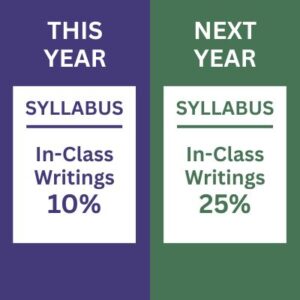 |
| In my March 25 TTT contribution, I promised some suggestions for how to rethink assessment. If a high-stakes writing assignment can be adequately created with gen-AI, assessing that piece of writing does not provide an accurate measure of how well a student has met a set of learning goals. Instead, we need to seek additional evidence. In some cases, that may mean re-weighting low-risk assessment categories; in other cases that may mean creating new types of assessment. In this TTT, I’ll discuss one example of how I am going to re-weight a low-risk assessment in my writing classes. In the next TTT, I’ll discuss an example of how I’m creating new assessments.
In-Class Writing (ICW): I often begin my classes with an in-class writing prompt. This activity addresses three goals: reading accountability, preparation for class discussion, and assessment of scaffolded writing tasks (e. g. composing a thesis, incorporating and analyzing evidence, textual analysis, etc.). Currently, I attribute 10% of the final grade to this category. In future classes, I am going to bump that up to 25% of the final grade because these ICWs are now much more accurate measures of a student’s having met the learning goals in the class. They are examples of what academic integrity professionals call “secure assessment.” Under the previous regime, students could do poorly on many of the ICWs and still get a really good grade in the class, which was fine because that grade would have been earned by performing well on the high-stakes writing assignments. However, with gen-AI, students can do poorly on the ICWs and still get a decent grade in the class without reading much and using gen-AI effectively to create their high-stakes assignment. Attributing a higher percentage of the grade to ICWs will (hopefully) mean that students will read more carefully and develop the writing skill each ICW is designed to assess, which in turn will better prepare them for writing the high-stakes essays and (maybe?) make them less likely to misuse gen-AI. |
